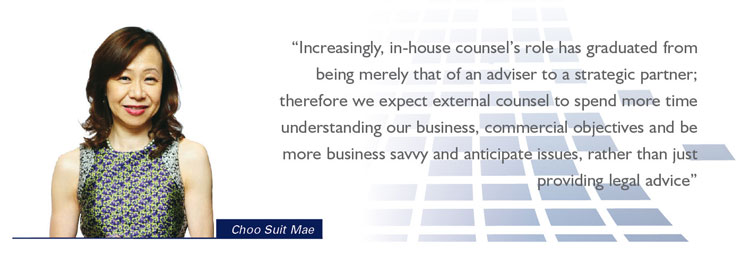Having made the leap from external to in-house, Choo Suit Mae, Group General Counsel of Sime Darby, knows from over 25 years working externally what it’s like to approach law from that point of view, and applies this constantly when working with external counsel. Giving her thoughts on life and law, she reveals what she believes to be the secrets of success in both, noting that courage in all aspects goes a long way.
 ASIAN-MENA COUNSEL: Can you tell us what led to your role at Sime Darby? Briefly as well, can you describe your career trajectory? Choo Suit Mae: I was a partner in the corporate department of Skrine, one of the largest and oldest all-services law firms in Malaysia, for about 3 years before joining Sime Darby in August 2006. Before Skrine, I was one of the founding partners of Zul Rafique & Pnrs, another major law firm based in Kuala Lumpur. I had also practised corporate/commercial law and corporate finance in Hong Kong for 8 years – first with Victor Chu & Co, Denton Hall (as it then was) and Reed Smith Richards Butler-before returning to Malaysia.I heard about a new position in Sime Darby – Head of Legal, Strategy – from a friend. The interview with the then CEO took all of 30 minutes. Shortly thereafter, I met my direct boss who was the Head of Strategy, who oversaw functions such as corporate finance, fundraising and value management. The Sime Darby group was then involved in several major corporate exercises. At one of the 1st meetings I attended with my then boss and his corporate finance team, the question they posed to me within 5 minutes of me sitting down was whether there was a takeover implication arising from a corporate chart showing a morass of companies with direct, indirect and cross-shareholdings. The diagram filled the entire length and breadth of the white board in the conference room. I knew then I would not have the luxury of easing myself into my new role and that the transition from external counsel to in-house counsel would be brief at best.A few months after I joined, the group was involved in one of the largest mergers in corporate Malaysia – the merger of three listed plantation groups – which culminated into what is Sime Darby Berhad today: the largest listed plantation company in the world. When the company was listed on Bursa Malaysia in November 2007, it had the highest market capitalisation. Today, Sime Darby’s market cap is about RM58 billion (approx. US$18.5 billion). Although the plantation division is the largest contributor to the group’s earnings, Sime Darby has four other core businesses – property, motors, industrial and energy & utilities. We operate in more than 20 countries and have a workforce of more than 100,000. Before the centralisation of the legal functions within the Sime Darby group, there were two legal departments at the head office – Group Legal, Strategy which advised on M&A transactions, fundraising, projects and corporate exercises (of which I was head) and Group Legal, Corporate Services, which had oversight of litigation/contentious matters and managed the group’s intellectual property issues. In 2010, the two legal departments were consolidated and I was designated Group General Counsel. The heads of the legal department of each of the core businesses/divisions also report to me directly. At head office, I have assigned ‘champions’ to look after each of the core businesses/divisions. The teams possess different experience and skills sets – ranging from M&A and transactional work to litigation – and have worked on multi-jurisdictional deals. This structure has enhanced reporting (and facilitated the escalation of legal issues/risks so that immediate action can be taken to address them), standardisation of advisory work, optimisation of resources, in-house training, and career development. The entire legal team now comprises 46 lawyers and we operate very much like a legal firm within the organisation. AMC: How do you add value to your company? |
 AMC: What is the best advice you have been given? Choo Suit Mae: All this will come to pass… the bad times (as well as the good, unfortunately) so we should not dwell on things and events which hold us back and prevent us from achieving our true potential. While we can, we should give of our best, be true to ourselves, be courageous and always do the right thing. AMC: What challenges have you perceived in your current role? AMC: Can you describe how legal practice has changed as the market has developed and clients have become more sophisticated? AMC: Can you describe a typical work day?
AMC |

















